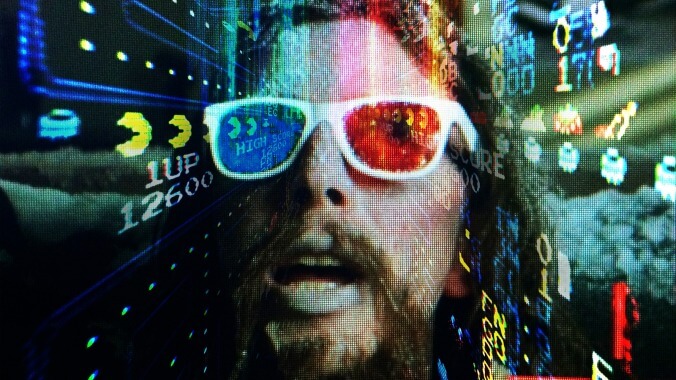Relaxer might be the grossest movie of the year

Twisted fantasies of depraved junk-food consumption and revenge, the slacker-psycho comedies of Joel Potrykus (Buzzard, The Alchemist Cookbook) plumb the dark corners of self-destructive Midwestern loserdom—though never as theatrically or as bizarrely as in the unhygienic delirium of Relaxer, a film that evinces the Michigan-based independent’s evolution from grunginess to surprising technical sophistication (in terms of both long-take camerawork and sound design) even as it verges on total, chunks-blowing gross-out. Over the course of 91 minutes, its hero, Abbie (Buzzard’s Joshua Burge), an unemployed man-child who may possess limited telekinetic powers, barfs milk, hungers for weeks-old unrefrigerated bologna, eats boiled shoe, and takes a face full of sewage. But he never leaves his spot on a saggy leather couch that sits in the middle of a squalid apartment somewhere in Potrykus’ home state. This disgusting symbiosis of couch and couch potato—the recesses of the psyche and the folds of the cushions—is one of Relaxer’s more vivid images. But despite the projectile fluids, the film’s real subject is something oozing within: those antisocial ideations that Potrykus grasps better than any other filmmaker on the indie scene.
While all of his previous features have taken place in a vague 1990s-to-early-2000s limbo, Relaxer is specifically set in 1999. When we first meet him, Abbie is being subjected to the latest in a long line of humiliating “challenges” devised by his Y2K-prepper brother, Cam (David Dastmalchian)—cruel tests of endurance and gag reflex that Abbie always fails. Hypercompetitive beta-machismo isn’t a new subject for Potrykus; one of the more memorable scenes in Buzzard involved a character trying to set a personal record for eating Bugles off a treadmill. But the relationship between Cam and Abbie is more sadistic, with Burge’s bulging eyes and pale, Buster Keaton-esque features alternately suggesting childlike naïveté and an addled stare. He wants his brother to respect him, and he wants their father, a sex offender who’s doing time in a California prison (which Abbie believes is near Disneyland), to come back.
Inspired by a magazine article about the now-disgraced video game champ Billy Mitchell, Cam comes up with “one more final, ultimate challenge”: beat level 256 of the original Pac-Man. It’s an impossible goal, given that reaching said level triggers one of the most famous bugs in classic arcade gaming—an integer overflow error not unlike the Y2K bug, suggesting some mystical confluences between the end of the game and the end of the world, protracted adolescence and pre-millennial fears, personal meltdown and glitch. Nonetheless, Abbie completely (and surreally) submits himself to the task, partly out of a mistaken belief that he will be rewarded a $100,000 prize. Weeks pass, then months. Per the rules of the challenge, he remains on the couch, dressed only in his undies, eventually acquiring a covering of dried god-knows-what and a beard that gives him an unsubtle resemblance to Leonardo DiCaprio’s Howard Hughes, locked in his screening room in The Aviator. (Quotations of Scorsese movies with alienated, mentally ill protagonists always seem to pop up in Potrykus’ films: Taxi Driver in Buzzard, The King Of Comedy in the earlier Ape.) Having repeatedly failed to get Chuck E. Cheese delivered to his insalubrious digs, he subsists on whatever is within reach. Where the solid waste goes is a question Relaxer leaves up to the audience’s imagination. It’s a big couch.
The basic structure resembles a play: long scenes, changes in lighting, occasional visits from friends (played by Andre Hyland, Adina Howard, and Amari Cheatom) and fumigators, an increasingly dilapidated set that mirrors Abbie’s own deterioration. The metaphors of his absurd existence are obvious: The guy literally can’t stand up for himself; he is playing an unwinnable game; he has untapped potential, even if its only outlet is making two-liter bottles of Faygo explode. Ditto the film’s crushing ironies (including Potrykus’ liberal use of music from Alexander Nevsky) and the underlying idea of a common grade-school wish—to stay at home all day, playing video games, eating garbage—taken to its nightmarish conclusion. But while there’s no shortage of movies that ask the audience to root for losers (especially when bullies of Cam’s magnitude are involved), there are few that get as far under the loser’s uncomfortable skin.
Buzzard cast Burge as a small-time grifter who convinced himself that he was a wanted man, maybe even a monster like Freddy Krueger, keeping just enough of a distance for the audience to recognize his megalomania. Relaxer takes the opposite approach. Like David Robert Mitchell’s upcoming Under The Silver Lake—another sure-to-be-polarizing exercise in paranoia and generational nostalgia—it entertains its protagonist’s delusions. The most important of these is a fantasy that a lot of us surrender to in our more neurotic moments: that there is some secret sequence of moves, like a cheat code, that will fix everything and allow us to progress to that next level. For a movie that’s often embarrassingly funny—with its absurdist hangout dialogue, posturing nobodies, and perfectly timed spews—Relaxer is fundamentally sad.